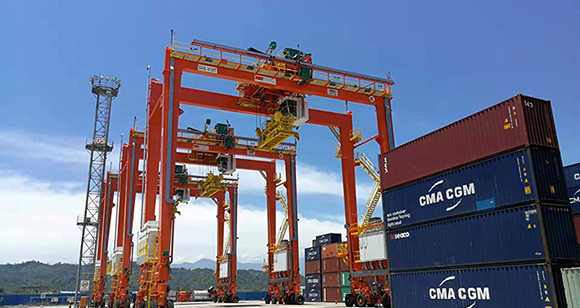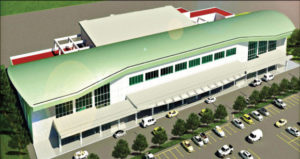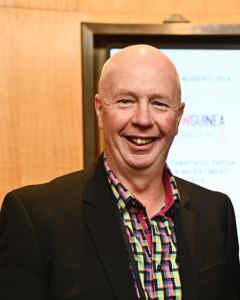John Byrne, President of the Lae Chamber of Commerce, expects Papua New Guinea’s economy in 2021 to be similar to 2020. He tells Business Advantage PNG that, although there is an underlying level of confidence in PNG’s second city, infrastructure projects and investment are urgently needed.
Business Advantage PNG (BAPNG): What do you think is the economic outlook for 2021?
John Byrne (JB): I can’t see the year being a lot different to last year in terms of the COVID-19 impact, the [Porgera] mining shut-down impact and the political challenges. That affects foreign exchange and foreign investment.
BAPNG: How do you assess what is happening with Newcrest’s proposed Wafi Golpu project?
JB: Recently, Sam Basil, the Deputy Prime Minister, said three times in a speech that the process would start again in the middle of the year. The whole thing will likely take two years to get fired up, however the confidence in that statement about the MOU (Memorandum of Understanding) and the MOA (Memorandum of Agreement) will also generate confidence in the community.
In Lae, we are not lacking confidence. We are out there doing our own businesses. But the country needs some infrastructure projects, which educate our people, employ our people and do all the things to get them off the streets, right down to that social micro level. Businesses, in particular those directly or indirectly involved in major resource projects, are waiting to see what happens with the Mining Act for investment – locally or otherwise – as they look to negotiate with government.
‘A new Nadzab Airport is a game changer as long as we have a highway attached to it that isn’t a dirt track.’
We hope for a resolution on the re-opening, in any form, of Porgera, which appears a long way from being solved. We look to our government and leaders to drive decisions with businesses that enable our people and communities to have a better future. Major resource projects employ, educate and provide a better quality of life, for many of our wonderful citizens.
BAPNG: How is the upgrading of Lae’s Nadzab airport going?
JB: The airport development is well under way. We at the Chamber have a high level of confidence that the project will be completed in 2022. The Japanese, when they win these projects, they just get it done using a lot of local content.
A new Nadzab Airport is a game changer, as long as we have a highway attached to it that isn’t a dirt track. The future is to have direct international flights (whether we get them straight away or not – with what is going around the world at the moment who is going to fly out to Lae?). But I have a high degree of confidence it is on track and the world will not be in a COVID-freeze forever.
BAPNG: The Prime Minister has emphasised the need for PNG to exploit its potential for agriculture. How feasible is that?
JB: I agree with him. But to develop agriculture requires a long-term strategy and the economy turning at the same time. So we need the resources projects – we are resource-rich but we don’t have the education of our people to do it yet, we don’t have the infrastructure, we don’t have the roads, we don’t have the refrigerators or the cool sheds to store our produce and export it, even domestically.
I commend the Government’s revitalised SMEs initiative, but education is critical to get a better and more robust SME and PNG-owned future. Traditionally, we are not long-term thinkers. Culturally, many eat or spend what they grow today and don’t plan for tomorrow. There needs to be sustained, proper, local content training.
BAPNG: There are many calls for government to pay its arrears. How important is that?
JB: Too many businesses are being crippled by government arrears and it is running right down the chain. There is a lot of noise saying they are fixing it, with the best of intent, but the outstanding debt is building. There are no Lae businesses that have gone down due to the lack of funding, but a lot are under pressure because the banks need to see positive cash-flow. There are businesses that have been waiting up to 18 months for payment. They are struggling and living hand-to-mouth to keep their staff employed
‘There are many examples of government and business working together and there is a willingness by both parties to truly develop and improve PNG.’
BAPNG: How has COVID-19 affected the expat labour situation?
JB: People who have been expats for a long time are saying: ‘I can’t do this any more. I can’t be away from my family for 12 or 18 months. I am just going to pack up and go.’ This creates a lot of opportunity for our local talent to shine and develop but, once again, only the businesses that have trained and developed will grow in this period with local leadership.
I always believe a blend of culture and background makes any economy or business grow. Fresh ideas, new ideas and leadership makes for a better future, and encourages our business leaders and governments to embrace training and development projects. We will likely see less expats.
BAPNG: Are you optimistic?
JB: None of the above is negative; there are many examples of government and business working together and there is a willingness by both parties to truly develop and improve PNG. Will we make mistakes? Sure. But it is what we learn, and how we are prepared to change our habits and work together for a better future, that will make PNG shine on the global stage.











Speak Your Mind